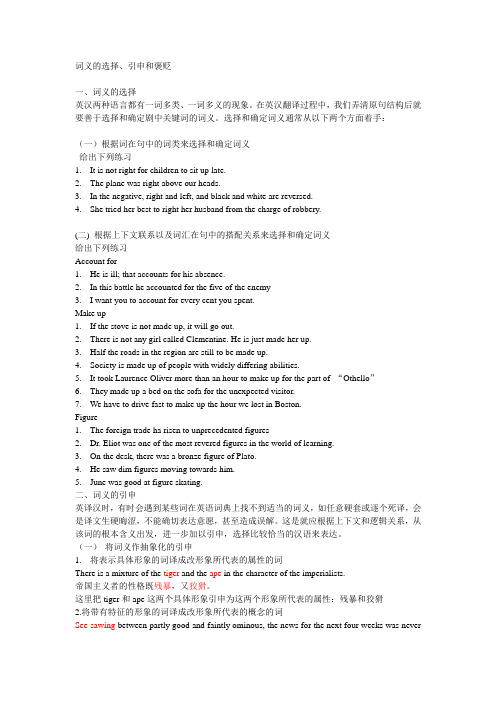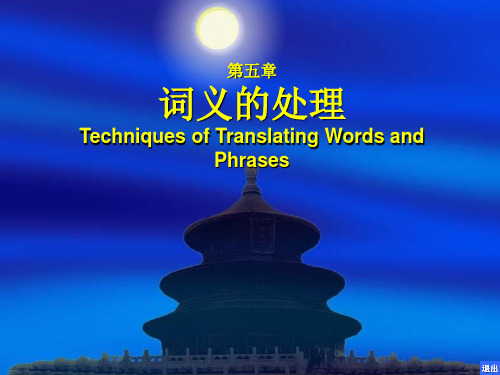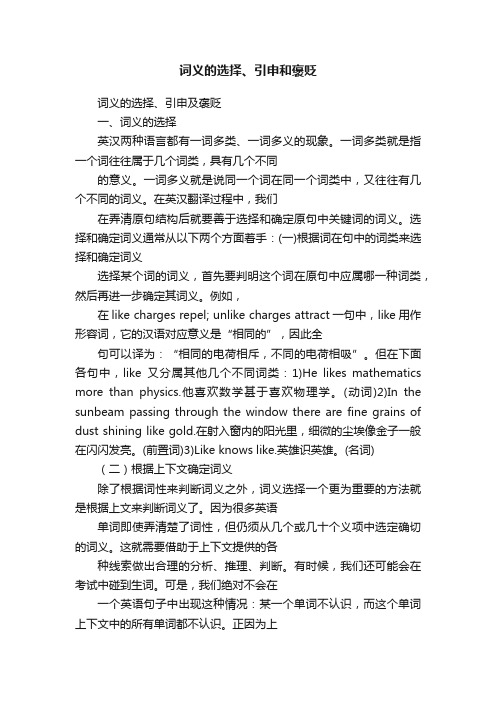第5讲词义的选择引申和褒贬
词义的选择、引申和褒贬

词义的选择、引申和褒贬一、词义的选择英汉两种语言都有一词多类、一词多义的现象。
在英汉翻译过程中,我们弄清原句结构后就要善于选择和确定剧中关键词的词义。
选择和确定词义通常从以下两个方面着手:(一)根据词在句中的词类来选择和确定词义给出下列练习1.It is not right for children to sit up late.2.The plane was right above our heads.3.In the negative, right and left, and black and white are reversed.4.She tried her best to right her husband from the charge of robbery.(二) 根据上下文联系以及词汇在句中的搭配关系来选择和确定词义给出下列练习Account for1.He is ill; that accounts for his absence.2.In this battle he accounted for the five of the enemy3.I want you to account for every cent you spent.Make up1.If the stove is not made up, it will go out.2.There is not any girl called Clementine. He is just made her up.3.Half the roads in the region are still to be made up.4.Society is made up of people with widely differing abilities.5.It took Laurence Oliver more than an hour to make up for the part of “Othello”6.They made up a bed on the sofa for the unexpected visitor.7.We have to drive fast to make up the hour we lost in Boston.Figure1.The foreign trade ha risen to unprecedented figures2.Dr. Eliot was one of the most revered figures in the world of learning.3.On the desk, there was a bronze figure of Plato.4.He saw dim figures moving towards him.5.June was good at figure skating.二、词义的引申英译汉时,有时会遇到某些词在英语词典上找不到适当的词义,如任意硬套或逐个死译,会是译文生硬晦涩,不能确切表达意愿,甚至造成误解。
词义的确定、引申和褒贬

以challenge一词为例:
⑴ I challenge you to answer my question. 我要你回答我的问题。 ⑵ She challenged him for lying. 她指责他说谎。 ⑶ I now challenge Mr. Ford to deny that statement. 现在我要问福特先生敢不敢否认那篇讲话。 ⑷ I’ve constantly challenged my own conclusion. 我一直在重新考虑自己的结论。 ⑸ The United States Government does not challenge that position. 美国政府对这一立场不提出异议。
⑹His question challenged us to think. 他提出的问题促使我们去思考。 ⑺ The task challenged his organizing ability. 这项任务对他的组织能力是一个考验。 ⑻ The sentry challenged us. 哨兵问我们口令。 ⑼ Recent discoveries have challenged their old notion. 最近的发现使得他们原来的观念成了问题。 ⑽They challenge for the Davis Cup. 他们决心争夺戴维斯杯。 ⑾ It’s the challenge of our time. 这是我们时代的要求。 ⑿ Their success is a challenge to my effort. 他们的成就鞭策我做出努力。
词义的选择
英国语言学家Firth说: Each word when
used in a new context is a new word.
词义的选择、引申和褒贬1

(二) 根据搭配
Don’t pick up strange boys. 别和不认识的男 before six? 你能不能在6点以前来接我? She picked up a used camera at the flea market. 她在跳蚤市场买了一架旧照相机。
(二) 根据搭配
我可不吃这一套。
I won’t take all this lying down. 他要请我们吃馆子。
He is going to invite us out to dinner. 这种纸不吃墨水。
This kind of paper doesn’t absorb ink. 这件事你如果说出去,我叫你吃不了兜着走。
If you let this leak out, I’ll make you sorry for it. 只要技术好,到哪儿都吃得开。 A person who has expertise is welcome anywhere. 他在银行存款,吃利息。 He deposits money in the bank to get interests.
(四) 根据词性不同,词义不同
I want to present everyone present a present. 我想给在场的各位赠送一份礼物。 动词,赠送;形容词,在场的;名词,礼物 He was too close to the door to close it. 他离门太近以至于关不了门。 形容词,接近的;动词,关
It is wise to object to the unknown object. 拒绝不明物体是明智的。 动词,拒绝;名词,物体 Peter decided to desert his wife in the desert. 彼得决定把妻子抛弃在沙漠里。 动词,抛弃;名词。沙漠
05b.词义的处理

23
返回章重点 退出
例3(p.70): It was as if he were reading me, absorbing all the information I provided, and adding details from his own experience and imagination to create a truer understanding of my words. (Marlena
5. 1. 5 词义选择, 看词在句中的位置
词义选择要看词在句子中的位置,前后的“邻居”等, 位置改变,意思随之而改变,邻居不同,词义不同。 例1:only (p.67) 1) The French only love arts. 【译文】法国人只爱文艺而已。(“only”是副词,强调动词
“love”)
5
返回章重点 退出
例2:sight(p.65) 1) It cost him a sight of trouble. 【译文】那给他招来一大堆麻烦。 2) I know him only by sight. 【译文】我跟他只是面熟。 3) He fell in love with her at first sight.【译文】他对她一见钟情。 4) The next election was already in sight. 【译文】下届选举已经临近。 5) Take a careful sight before firing. 【译文】瞄准之后再射击。 【译文】做你认为对的事。 6
【译文】生活有苦也有甜。(抽象)
例2(p.69):Watch out for Harlow, he’s full of mickey mouse ideas.
词义的选择、引申和褒贬

词义的选择、引申和褒贬词义的选择、引申及褒贬一、词义的选择英汉两种语言都有一词多类、一词多义的现象。
一词多类就是指一个词往往属于几个词类,具有几个不同的意义。
一词多义就是说同一个词在同一个词类中,又往往有几个不同的词义。
在英汉翻译过程中,我们在弄清原句结构后就要善于选择和确定原句中关键词的词义。
选择和确定词义通常从以下两个方面着手:(一)根据词在句中的词类来选择和确定词义选择某个词的词义,首先要判明这个词在原句中应属哪一种词类,然后再进一步确定其词义。
例如,在like charges repel; unlike charges attract一句中,like用作形容词,它的汉语对应意义是“相同的”,因此全句可以译为:“相同的电荷相斥,不同的电荷相吸”。
但在下面各句中,like又分属其他几个不同词类:1)He likes mathematics more than physics.他喜欢数学甚于喜欢物理学。
(动词)2)In the sunbeam passing through the window there are fine grains of dust shining like gold.在射入窗内的阳光里,细微的尘埃像金子一般在闪闪发亮。
(前置词)3)Like knows like.英雄识英雄。
(名词) (二)根据上下文确定词义除了根据词性来判断词义之外,词义选择一个更为重要的方法就是根据上文来判断词义了。
因为很多英语单词即使弄清楚了词性,但仍须从几个或几十个义项中选定确切的词义。
这就需要借助于上下文提供的各种线索做出合理的分析、推理、判断。
有时候,我们还可能会在考试中碰到生词。
可是,我们绝对不会在一个英语句子中出现这种情况:某一个单词不认识,而这个单词上下文中的所有单词都不认识。
正因为上下文的存在,这也给我们翻译中解决生词提供了突破口。
因此,在翻译中,我们一定要随时注意上下文,上下文的不同在很大程度上决定了单词意义的不同,也在很大程度上决定了翻译中理解和表达的正确性、准确性和译文是否通顺。
笔译(词语的选择、引申和褒贬)

(二) 根据上下文联系以及句中的搭配关系 来选择和确定词义。 He is the last man to come. 他是最后来的。 He is the last man to do it. 他决不会干那件事。
He is the last person for such a job. 他最不配(最不适合)干这工作。 最不配(最不适合) He should be the last to blame. 怎么也不应该去怪他。 He is the last man to consult. 根本不宜找他商量。 This is the last place where I expected to meet you. 我怎么也没有料到会在这个地方见到你。
In the sunbeam passing through the window there are fine grains of dust shining like gold. (prep.) 在射入窗户的阳光里,细微的尘埃象金子一般在闪闪 发亮。 Like knows like. (n.) 英雄识英雄。
练习
1. It is not right for children to sit up late. The plane was right above our heads. In the negative, right and left, and black and white are reversed. She tried her best to right her husband from the charge of robbery.
4. No sooner was the avalanche of Christmas cards swept away the publishers began to fill the shops with their novel valentines. 5. The habit of sending gifts is dying out, which is disappointing for the manufacturers, who nevertheless still hopefully dish out presents for Valentine’s Day in an attempt to cash in.
英语考试笔译词语的选择引申和褒贬精品PPT课件

3. IBM has a quite handsome increase of
productivity this year.
4. Information technology will be at the heart
of global economic competition in the 21st century.
好转,时而又有点不妙,两种情况不断地交 替出现,一直没有明朗化。Βιβλιοθήκη (二)将词义作具体化的引申
1、英语中也有用代表抽象概念或属性的词来 表示一种具体事物,译成汉语时一般可作具 体化引申。
Vietnam was his entré e to the new
Administration, his third incarnation as a foreign policy consultant.
5. Race relations in the USA continue to be a
thorny problem.
6. Traditional consumer attitudes are a
major obstacle for cyber-merchants.
7. Wildfires caused by lightning or human
练习
1. A recent survey revealed that the divorce
rate has rocketed as women’s financial dependence on men has plummeted.
2. E-commerce has not yet enthusiastically
词义的选择、引申和褒贬1

(三) 根据全文或句子的知识内容
There are known knowns. These are things we know that we know. There are known unknowns. These are things that we know we don’t know. But there are also unknown unknowns. These are things we don’t know. 我们懂得我们知道一些人所知的情况,我们也懂得我们还不知道 众所周知的不可预测的形势,但还存在我们没有意识到我们不懂的 尚未了解的未知局面。
The insurance was invalid for the invalid. 该险种对残疾人无效。形容词,无效的;名词,残疾人
The wind was too strong to wind the soil. 风太大以至于吹不起风帆。名词,风;动词,吹动
The dump was full to refuse more refuse. 垃圾堆已堆满,不能再堆了。动词,拒绝;名词,垃圾
(二) 根据搭配
请让一让。
Excuse me. / Please let me pass. 她让我在雨里等了两个钟头。
She kept me waiting in the rain as long as two hours. 大夫让我卧床。
The doctor advised me to stay in bed. 他把客人让进来。
剧痛 急转弯 激烈的斗争
4. 尖刻,苛刻,易怒: A sharp tongue A sharp temper A sharp criticism
5. 刺骨,刺鼻,刺耳: A sharp frost A sharp smell A sharp voice
- 1、下载文档前请自行甄别文档内容的完整性,平台不提供额外的编辑、内容补充、找答案等附加服务。
- 2、"仅部分预览"的文档,不可在线预览部分如存在完整性等问题,可反馈申请退款(可完整预览的文档不适用该条件!)。
- 3、如文档侵犯您的权益,请联系客服反馈,我们会尽快为您处理(人工客服工作时间:9:00-18:30)。
A. 根据上下文中的词性确定词义
(round)
• The little boy’s eyes grew round with delight. • 这个小男孩高兴得眼睛都睁得滚圆。 • adj. 圆(形)的
• She rounded the corner at top speed. • 她以最高速度拐弯。 • v. 环绕……而行,拐弯
• 谈恋爱要去花前月下,酒吧茶座,最好吃西餐。 如果去一些不浪漫的场合,谈情说爱就很难。朱 丽叶柔声地呼唤:“罗米欧,罗米欧,你在哪 里?”他总不能瓮声瓮气地回答:“我在洗手间, 亲爱的。”
第5讲词义的选择引申和褒贬
语境对词义的决定作用
• A. 根据上下文中的词性确定词义 • B. 根据上下文联系及搭配关系确定词义
缘。
第5讲词义的选择引申和褒贬
Key to Homework
• Many of these people work in various technical jobs where they have little or no direct contact with the public – in aircraft maintenance or air traffic control, for example.
第5讲词义的选择引申和褒贬
A. 根据上下文中的词性确定词义
(light)
• The lake was bathed in the soft light of the moon.
• 湖水沐浴在柔和的月光下。 • n. 光,光线,光亮
• I lighted my sister up the stairs to bed with a candle.
Key to Homework
• 2008 witnessed a wonderful Olympic Games in Beijing.
• 2008年,在北京举办的奥运会十分精彩。 • The little chap’s good-natured honest face won
his way for him. • 这小伙子长相老实,看上去脾气也好,到处有人
• 广义:非语言性语境指的是交流过程中某一话语 结构表达某种特定意义时所依赖的各种主客观因 素,包括时间、地点、场合、话题、交际者的身 份、地位、心理背景、文化背景、交际目的、交 际方式、交际内容所涉及的对象以及各种与话语 结构同时出现的非语言符号(如姿势、手势)等。
第5讲词义的选择引申和褒贬
一、词义的选择
第5讲词义的选择引申和褒贬
一、词义的选择
• 3、 A word is not a crystal, transparent and unchanging; it is the skin of a living thought and may vary greatly in color and content according to the circumstances and time in which it is used. ----Holmes
第5讲词义的选择引申和褒贬
B. 根据上下文联系及搭配关系确定词义 (last)
• I wouldn’t marry you if you were the last man on earth. • 即使你是世界上仅有的男人,我也不愿嫁给你。 • I’ve said my last word on this question. • 关于此问题,我已尽述己见。 • “Women always have the last word!” • “总是女人说了算嘛!” • Miniskirts are the last things she’d like to wear. • 她最不愿意穿超短裙。 • He is the last person to be blamed. • 他最不该受指责。 /责怪任何人都可以,就是不能责怪他。
• 一个词语不是一个水晶体,晶莹剔透,永无变化, 而是充满生命力的思维外壳,它可以依据其使用 的情景和时间的变化而在色彩和内容上有很大的 变化。——霍姆斯(19世纪诗人)
第5讲词义的选择引申和褒贬
一、词义的选择
• 语境的定义(Malinowsky, 1923)
• 狭义:语言性语境指的是交际过程中某一话语结 构表达某种特定意义时所依赖的各种表现为言辞 的上下文,它既包括书面语中的上下文,也包括 口语中的前言后语;
without which meaning does not exist. -Malinowsky • 语境是决定语义的唯一因素,舍此别无意义可言。— —马林诺夫斯基 (人类学家) • 2、 Each word when used in a new context is a new word. ----Firth • 每个词语在用于新的语境中时则是一个新词。-- 弗斯 (英国语言学家)
第5讲词义的选择引申和褒贬
A. 根据上下文中的词性确定词义 (round)
• He was knocked out in the second round. • 他在第二回合的比赛中被击倒。 • n. 回合
• The Earth turns round once in 24 hours. • 地球二十四小时自转一圈。 • adv. 绕圈子,围绕地
• 我点着蜡烛带妹妹上楼去睡觉。 • v. 点火,点燃
第5讲词义的选择引申和褒贬
A. 根据上下பைடு நூலகம்中的词性确定词义
(light)
• It’s so light that a child could lift it. • 这东西太轻了,孩子都能拿起来。 • adj. 轻的,不重的
• You should travel light. • 你应该轻装上路。 • adv. 轻装地
• 很多航空公司职员都从事技术性工作,比如机械 维护或空中交通管制等,他们很少与乘客接触。
第5讲词义的选择引申和褒贬
第5讲 词义的选择、引申和褒贬
第5讲词义的选择引申和褒贬
Outline
• 一、词义的选择 • 二、词义的引申 • 三、词义的褒贬
第5讲词义的选择引申和褒贬
一、词义的选择
• 语境对词义的决定作用 • 1. Context is the sole determiner of meaning
